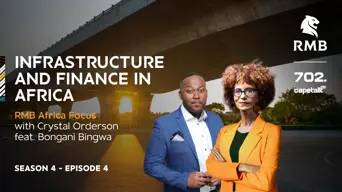Why innovative financing is critical to closing Africa’s infrastructure gap now
Kopano Mohlala
5 June 2025 | 9:53Sponsored by RMB CIB

Acclaimed journalist Crystal Orderson, who specialises in economic and political affairs concerning the African continent, joins 702's Bongani Bingwa to discuss Africa's infrastructure challenges and opportunities.
Listen Below:
"The infrastructure deficit is massive."
Crystal Orderson, Journalist
The African Development Bank estimates that the continent needs between $130 billion and $170 billion annually to close this gap.
However, Orderson notes that there are pockets of investment in various sectors, including minerals and metals, transport, logistics, water and sanitation, and digital infrastructure, but this is country-specific.
“This is, of course, driven by specific population growth, urbanisation, and energy needs, but those are in specific countries.”
- Crystal Orderson, Journalist
One promising yet underutilised source of funding is African pension funds.
Financing fund managers indicate that these funds hold tremendous potential. In 2020, African pension funds managed approximately $500 billion in assets, with projections suggesting this could grow to R7.5 trillion by 2025.
Yet, less than 3% of these assets are allocated to infrastructure.
“There needs to be a confidence vault that these pension funds should invest in infrastructure, because that’s where the growth could lie for countries.”
- Crystal Orderson, Journalist
Much of this capital remains tied up in low-risk government bonds or foreign markets, primarily because of a lack of domestic investment confidence.
Nonetheless, there are positive examples. In South Africa, the Government Employees Pension Fund has allocated funds for infrastructure, and in Kenya, the Retirement Benefits Authority has committed nearly 10% of its portfolio to infrastructure development.
There are two key investors in major projects across the continent:
- The African Infrastructure Managers Fund invests in northern, eastern, western, and southern Africa, having garnered assets worth approximately $3.2 billion, with a focus on specific infrastructure projects across the continent.
- The African Development Bank, which has been investing in Africa's agricultural sector, announced that $ 500 million has been invested in small-scale farmers and agribusiness.
Another success story is Ethiopia’s thriving coffee sector, which reached $2 billion in exports in just 10 months.
“Over a third of women are actually part of the coffee industry and make up 75% of the labour sector.”
- Crystal Orderson, Journalist
With support, Ethiopia's government has been able to successfully invest in the country's small-scale farming activities.
One of the most compelling examples of successful infrastructure financing is the 480-kilometre railway line connecting Nairobi to Mombasa in Kenya. The Mombasa-Nairobi Standard Gauge Railway was completed in 2017, and the project was financed through a combination of public-private partnerships and international funding sources.
Orderson recalls how, in the past, a trip between these two major cities entailed a 12-hour journey along potholed roads and through traffic jams. Today, the railway not only transports over 30,000 passengers daily but also efficiently manages large volumes of cargo through Kenya’s ports.
“It’s quite interesting because you had funding coming together, and it has been a game-changer. Now you can take a ride in the morning and arrive in Mombasa at the beach during lunchtime.”
- Crystal Orderson, Journalist
She says Africa has the capital - but what it needs is confidence.
"It takes political will - with the private sector and multilateral institutions to come together to make a difference."
- Crystal Orderson, Journalist
With the right partnerships, creativity, a suitable environment, and innovative thinking, pension funds can be effectively utilised to finance large-scale infrastructure projects. That includes attracting private capital through blended financing structures and public-private, which are crucial to bridging the gap.
Catch up on episodes of the RMB Africa Focus that you may have missed here.
Get the whole picture 💡
Take a look at the topic timeline for all related articles.
















